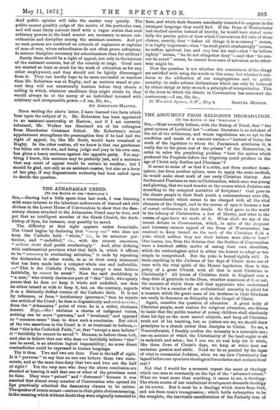THE ATHANASIAN CREED.
[TO THE EDITOR OF THR "SPECTITOR."]
Zia,—Having had a little spare time last week, I was listening with some interest to the laborious endeavours of learned and able divines in the Lower House of Convocation to show that the dam- natory clauses attached to the Athanasian Creed may be true, and .yet that an intelligent member of the Greek Church, the Arch- Jsishop of Syra, for instance, may possibly be saved.
The difficulty at first sight appears rather formidable. The Creed begins by declaring that "every one" who does not keep the Catholic faith "whole," i.e., in its minutest par- -ticular, and " undefiled," i.e., with the utmost exactness, "without doubt shall perish everlastingly." And, after defining with mathematical precision what that faith is, which it affirms to be "necessary to everlasting salvation," it ends by repeating the declaration in other words, so as to rivet every statement that has been made into a compact whole one and indivisible, —" This is the Catholic Faith, which except a man believe faithfully, he cannot be saved." Now the said Archbishop is 4‘ a man," who utterly denies one part of "this" faith, who openly .avows that he does not keep it whole and undefiled, nor does .he either intend or wish to keep it, but, on the contrary, regards it as a distinctly defiled version of the Catholic faith. It is not by inference, or from " involuntary ignorance," that he rejects one article of the Creed ; he does so dogmatically and totident verbis ; from the " Athanasian " point of view, he is a wilful, obstinate _heretic. Ergo, —No I exclaims a chorus of indignant voices, nothing can be more "perverse," and "irrational," and opposed
" common-sense" than to draw such a conclusion. But which of the two assertions in the Creed is it so irrational to believe,— that "this is the Catholick Faith," or, that "except a man believe" it "faithfully he cannot be saved"? Because, to believe them both, .and also to believe that one who does not faithfully believe "this" can be saved, is an absolute logical impossibility ; no more direct -contradiction could be expressed in human language.
Try it thus. Two and two are four. Four is the half of eight. Is it " perverse " to say that no one can believe those two state- ments, and at the same time deny that two and two are the half of eight ? Yet the very men who deny the above conclusion are shocked at hearing it said that one or other of the premisses must be false. They were "pained" and "distressed" because it was asserted that almost every member of Convocation who opened his lips practically admitted the damnatory clauses to be untrue. The speaker of course meant—untrue in their plain obvious meaning, in the meaning which without doubt they were originally intended to bear, and which their framers manifestly intended to express in the strongest language they could find. If the Dean of Westminster had studied caution instead of brevity, he would have stated more fully the precise point of view which Convocation did take of those clauses, namely, that "before all things it is necessary" means, it is highly important—that "he shall perish everlastingly" means, he suffers spiritual loss and ?nay lose his soul—that "he believe rightly" means, " he do not altogether deny "—and that "he can- not be saved" means, he cannot be so sure of salvation as he other- wise might be.
Now the question is not whether the consciences of the clergy are satisfied with using the words in this sense, but whether it con- duces to the edification of our congregations and to public morality, to make solemn declarations which can only be believed by either clergy or laity on such a principle of interpretation. This is the issue to which the debate in Convocation has narrowed the controversy.—I am, Sir, &c.,
20 IVarwick Square, S. W., -1Iay 4. SAMUEL MINTON.


































 Previous page
Previous page